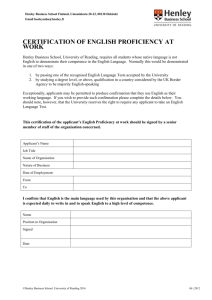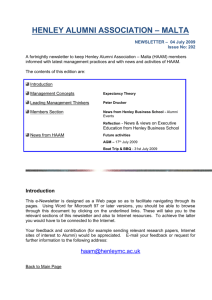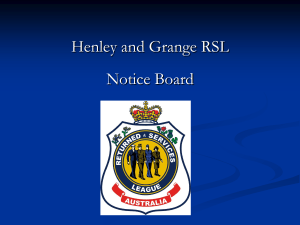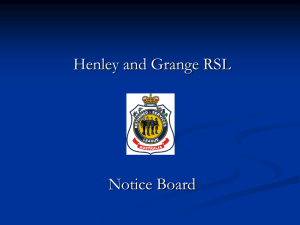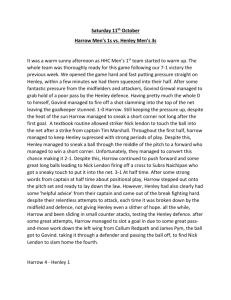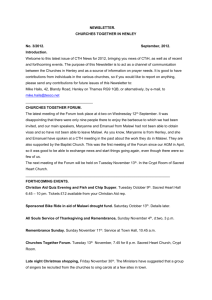Leading Management Thinkers
advertisement
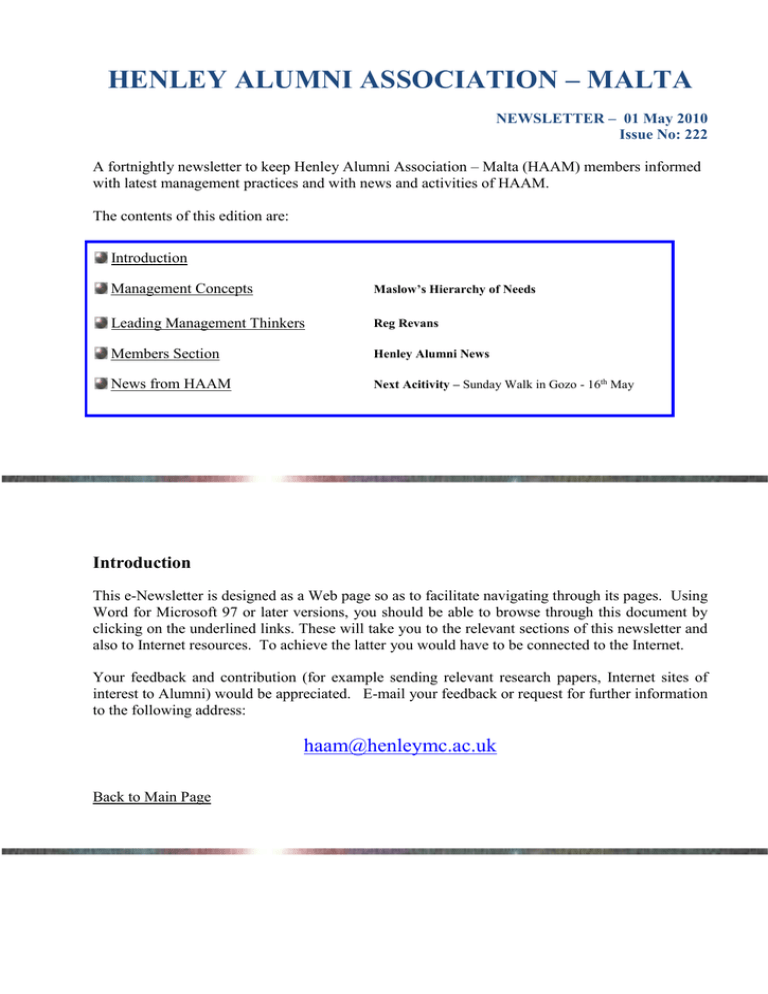
HENLEY ALUMNI ASSOCIATION – MALTA NEWSLETTER – 01 May 2010 Issue No: 222 A fortnightly newsletter to keep Henley Alumni Association – Malta (HAAM) members informed with latest management practices and with news and activities of HAAM. The contents of this edition are: Introduction Management Concepts Maslow’s Hierarchy of Needs Leading Management Thinkers Reg Revans Members Section Henley Alumni News News from HAAM Next Acitivity – Sunday Walk in Gozo - 16th May Introduction This e-Newsletter is designed as a Web page so as to facilitate navigating through its pages. Using Word for Microsoft 97 or later versions, you should be able to browse through this document by clicking on the underlined links. These will take you to the relevant sections of this newsletter and also to Internet resources. To achieve the latter you would have to be connected to the Internet. Your feedback and contribution (for example sending relevant research papers, Internet sites of interest to Alumni) would be appreciated. E-mail your feedback or request for further information to the following address: haam@henleymc.ac.uk Back to Main Page Management Concepts This section contains an article on some essential business idea/s. Remind yourself and get to grips with key management concepts in a language that's easy to understand. Maslow’s Hierarchy of Needs One of the best known theories explaining the actions of people is that of Dr. Abraham Maslow. In his book Motivation and Personality, published in 1954, Maslow hypothesized that people are motivated by a hierarchy of needs. When low-level needs are satisfied, individuals are no longer motivated by them. As each level of needs is met, individuals progress to higher level motivators. Before Maslow, the psychological world was awash in behaviorism and psychoanalysis. Before Maslow the focus was on dysfunctional personalities, but he moved away from this narrow view to examine the operation of healthy personalities and successful individuals, popularizing psychological humanism. In so doing he made a major contribution both to psychology and to business. Maslow’s hierarchy of needs has been used to underpin a variety of people management techniques, especially approaches to motivation, ever since. Maslow examined the lives of successful people like Abraham Lincoln instead of concentrating only on people with problems. Although he studiously avoided the use of the word “spiritual,” Maslow seemed to suggest that aside from the people with emotional limitations and problems, there were times when man was at his best. He introduced psychology to the abstract, though nevertheless important concepts of truth, goodness, beauty, unity, transcendence, aliveness, uniqueness, perfection, justice, order and simplicity. These values he called “B-values.” Maslow asserted that people are not merely controlled by mechanical forces (the stimuli and reinforcement forces of behaviorism) or unconscious instinctive impulses as asserted by psychoanalysis, but should be understood in terms of human potential. He believed that humans strive to reach the highest levels of their capabilities. People seek the frontiers of creativity, and strive to reach the highest levels of consciousness and wisdom. People at this level and below were labeled by other psychologists as “fully functioning” or possessing a “healthy personality.” Maslow called the people who were at the top “self-actualizing” persons. Maslow created a hierarchical theory of needs. The animal or physical needs were placed at the bottom, and the human needs at the top. This hierarchic theory is often represented as a pyramid, with the base occupied by people who are not focused on values because they are concerned with the more primal needs of physical survival. Each level of the pyramid is dependent on the previous level. For example, a person does not feel the second need until the demands of the first have been satisfied. There are five basic levels in Maslow’s hierarchy of needs: 1. Physiological needs. These needs are biological and consists of the needs for oxygen, food, water, and a relatively constant body temperature. These needs are the strongest because if deprived, the person would die. 2. Safety needs. Except in times of emergency or periods of disorganization in the social structure (such as widespread rioting) adults do not experience their security needs. Children, however often display signs of insecurity and their need to be safe. 3. Love, affection and belongingness needs. People have needs to escape feelings of loneliness and alienation and give (and receive) love, affection and the sense of belonging. 4. Esteem needs. People need a stable, firmly based, high level of self-respect, and respect from others in order to feel satisfied, self confident and valuable. If these needs are not met, the person feels inferior, weak, helpless and worthless. 5. Self-actualization needs. Maslow describes self-actualization as an ongoing process. Selfactualizing people are, with one single exception, involved in a cause outside their own skin. They are devoted, and work at something, some calling or vocation. This, Maslow said, explained why a musician must make music, an artist must paint, and a poet must write. If these needs are not met, the person feels restlessness, on edge, tense, and lacking something. Lower needs may also produce a restless feeling, but the cause is easier to identify. If a person is hungry, unsafe, not loved or accepted, or lacking self-esteem the cause is apparent. But it is not always clear what a person wants when there is a need for self-actualization. Maslow believed that the only reason that people would not move through the needs to selfactualization is because of the hindrances placed in their way by society – including their employer. Work can be a hindrance, or can promote personal growth. Maslow indicated that an improved educational process could take some of the steps listed below to promote personal growth: • Teach people to be authentic, to be aware of their inner selves and to hear their inner-feeling voices. • Teach people to transcend their own cultural conditioning, and become world citizens. • Help people discover their vocation in life, their calling, fate or destiny. This is especially focused upon finding the right career and the right mate. • Teach people that life is precious, that there is joy to be experienced in life, and if people are open to seeing the good and joyous in all kinds of situations, it makes life worth living. Key Reading Maslow, A.H. (1954) Motivation and Personality, Harper & Row, New York Maslow, A.H. (1983) The Farther Reaches of Human Nature, Peter Smith Publishing Maslow, A.H. (1968) Toward a Psychology of Being, D. Van Nostrand Company Maslow, A.H. (1998) Maslow on Management, John Wiley & Sons, New York Back to Main Page Leading Management Thinkers This page gives a short profile and backgrounder on the leading management thinkers, past and present __________________________________ Reg Revans In the 1920s Reg Revans (1907-2003) worked at Cambridge’s Cavendish Laboratories alongside five Nobel Prize winners. An Olympic athlete, he later became the first director of education and training at the National Coal Board. He concluded that colliery managers and miners themselves needed to acknowledge the problems they faced and then attempt to solve them. Revans spent two years underground to examine the real problems facing miners. This reinforced his idea that learning comes when problems are aired and shared in small groups of ‘comrades in adversity’. The pits that tried Revans’ methods recorded a 30 percent increase in productivity. His theory, christened action learning, is deceptively simple. It is concerned with learning to learn by doing, a process for which Revans created a simple equation – L = P + Q – learning occurs through a combination of programmed knowledge (P) and the ability to ask insightful questions (Q). In the 1960s, Revans was apparently set on an academic career. The UK’s first professor of industrial administration at Manchester University, he was involved in the debate about the nature of the city’s soon-to-be-established business school. Again, action learning ruffled establishment feathers and Revans departed for Belgium to lead an experiment launched by the Foundation Industrie-Université with the support of the country’s leading business people and five universities. ======================================= Back to Main Page MEMBERS SECTION This page is dedicated to the contribution of our members. Members are invited to contribute to this page by submitting e.g. their own profiles, research studies, job opportunities, product/service advertisements, etc. All contributions must be in Word 97 format and not greater than 200K Bytes so as to facilitate distribution through this Newsletter. --------------------------------------------- Welcome to the April 2010 issue of our eNewsletter. Events: 19 May 2010: “Innovation in Healthcare: the Route to Saving £20Bn?” - Healthcare Special Interest Group event, Clydesdale Bank, London EC2V 7QQ Speakers: Jim Dawton, Designit UK; Andrew Rudd, Andrew Rudd Consulting and Peter Ellingworth, ABHI. Please contact: irina.woodford@henley.com 20 May 2010: eBusiness SIG - with Natalie Turner, CEO of entheo, a leadership innovation network, at the British Bankers Association, Pinners Hall, London EC2N 1EX. Please contact: amanda.proddow@henley.com 20 May 2010 - the Annual Belbin Award Keynote Lecture - 'The food industry is a great place to work' with Justin King, Chief Executive of J Sainsbury plc . Professor Meredith Belbin will be in attendance. Please contact: elizabeth.moxey@henley.com 26 May 2010 - Career Development Service - Evening event Optimising Linked-in, Job Search and Research - the latest cutting-edge strategies at Greenlands, Henley. Please contact: linda.thorne@henley.com 27 May 2010: RREF Breakfast Forum – ‘The London 2012 Olympic Story’ - with Chair Duncan Innes, Director of Real Estate, Olympic Legacy Company and speakers Lawrence Chadwick, former Development Director, Grosvenor, currently working with Newham London on the legacy implications of the 2012 Olympics and Ralph Luck, Director of Property, Olympic Delivery Authority. Please contact: r.robson@rref.reading.ac.uk 02 June 2010: “Growing People – a Leadership Journey” – with Dame Mary Marsh, Director of Clore Social Leadership Programme. Henley Third Sector Network event,Henley Business School, Greenlands campus. Please contact: irina.woodford@henley.com 8 June 2010: Career Development Service – Evening event Gavin Sanderson, Partner, PricewaterhouseCoopers LLP gives an insight to life at PwC at Greenlands, Henley. Please contact: linda.thorne@henley.com 15 June 2010: Career Development Service – Evening event Don Leslie, Director, Management Consultancy Recruitment Division from Beament Leslie Thomas will present MBAs & Management Consultancy at Greenlands, Henley. Please contact: linda.thorne@henley.com 17 June 2010: Leadership of Organisational Change SIG: ‘Leading Organisational Change Through Conversations’ – with Richard Hordern, Client Director, Henley Business School. Venue: British Bankers Association, Pinners Hall, London EC2N 1EX. Please contact: amanda.proddow@henley.com 19 June 2010: Henley Alumni Germany: Top Event with Henley’s Moira Clark. – For full details please see: www.hag.de/ 22 June 2010 - The London & SE Group - Summer Garden Party An opportunity to bring your partners and guests to a networking event in the gardens of the Athaenaeum, London. Please contact: amanda.proddow@henley.com 4 July 2010 - Members' Day - Bookings will open mid-May. If you would like to receive an invitation, please email us on: alumni@henley.com 6 July 2010: Career Development Service – Evening event Senior level executive search with Eric Salmon & Partners at Greenlands, Henley. Please contact: linda.thorne@henley.com 8 July 2010: Career Development Service - ½ day workshop CV Building at Greenlands, Henley. Please contact: linda.thorne@henley.com 9-11 July 2010: Cranfield MBA Regatta 2010 - If you would like to join the Henley sailing team to compete against and beat other leading business schools, in the first instance please contact: amanda.proddow@henley.com 28 July 2010: The Lord Chamberlain’s Men perform an outdoor production of Shakespeare’s “The Tempest” at Henley Business School, Greenlands Campus. For full details and an alumni discount please contact: elizabeth.moxey@henley.com 24 September 2010: Henley Golf Day - Sonning Golf Club. Calling all golfers! Join us for the 5th Henley Golf Challenge for an 18 hole Stapleford competition. To join the emailing list please contact: irina.woodford@henley.com For details of events events organised by our International Alumni Associations please click here For details of RREF (Reading Real Estate Foundation) events please click here Dates for your diary: 17 June 2010 – Henley Medical Suppliers Forum event that attempts to unpack the future of Healthcare from a suppliers view point. What do the next three to five years hold from a supplier’s perspective. Speakers: David Fawkes, responsible for WCL's work in NHS commissioning and Dave Snowdon, founder and chief scientific officer of Cognitive Edge. Central London location (TBC). Please contact: irina.woodford@henley.com 24 June 2010: Henley Alumni France – Paris Evening Event at Le Méridien Etoile, Paris. Speaker to be advised. Please contact: grandjean.cjr@wanadoo.fr 7 September 2010: The London & SE Group – Speaker tbc and networking event at the Athenaeum, London W1. Please contact: amanda.proddow@henley.com 9 September 2010: The Third Sector Network event with Debra Alcock-Tyler, Directory of Social Change, Central London Location. Please contact: irina.woodford@henley.com 29 September 2010: Henley Medical Suppliers Forum event – “More for Less or More for the Same” with John Hanson Sales Effectiveness Director ‘Bausch & Lomb’, Central London location (TBC). Please contact: irina.woodford@henley.com 14 October 2010: The London & SE Group – Annual Gala Dinner at the Athenaeum, London W1. Please contact: amanda.proddow@henley.com 17 November 2010: Henley Medical Suppliers Forum event that looks at the changing needs, capabilities, competencies and processes of a consolidating industry.How can suppliers effectively engage and manage a professionalising and increasingly demanding procurement team? Speakers to be confirmed. Location: Henley Business School Greenlands campus. Please contact: irina.woodford@henley.com 7 December 2010: The London & SE Group – Christmas Event at the Athenaeum, London W1. Please contact: amanda.proddow@henley.com MBA/DBA Event Dates: 11 May 2010: 'Find out how the MSc and DBA Programmes can enhance your senior management and consultancy skills and give you maximum professional credibility. 10% discount for Henley alumni'. Book your place or contact anna.bean@henley.com For full details and to register for these events please contact: caroline.followell@henley.com For any alumni queries, please do not hesitate to contact, The Henley Alumni Team - Chris, Irina, & Amanda. Henley Business School Email: alumni@henley.com Back to Main Page NEWS FROM HAAM Latest news, appointments, events can be found in this page. ---------------------------------Sunday Walk Gozo 16th May 2010 Our next networking activity is a Sunday outing for the whole family and friends. This time the committee is organising this event in Gozo on Sunday 16th May which also coincides with the Notte Gozitana activities. The follow is the program we have prepared: For those coming from Malta, meet at Cirkewwa at 09:30hrs to catch the 09:45hrs ferry to Gozo. At 10:30hrs all participants meet at Mgarr Terminal and start our Walk. Two routes have been chosen. The easier route is paved road all the way and a more demanding route over rough ground and sometimes (for a very short distance) very close to the cliff’s edge. The latter is not suitable for children. However, those who can take this route will not be disappointed as the scenery is great. The easy route is a little shorter than the difficult route, both are approximately 3 km. The two groups will converge and then walk together to Il-Wileg Restaurant (around 0.5 km). IlWileg is providing us with a Lunch menu. Lunch is programmed to start at 13:00hrs. After lunch, those returning to Malta will go to the Gozo ferry in one group using some short-cuts, with a distance of around 2km over paved road and all downhill. Price for Lunch is €10.00 for members and their partners. Guests are welcome to join us and pay €20.00 for lunch. Children (3 – 11) pay half the price. It is recommended that everyone comes in comfortable walking shoes and brings water, caps, sunglasses etc. In case of inclement weather or in need of some assistance phone the undersigned on 79093890. Application: Kindly print notice, sign it and mail it with cheque (payable: "Henley Alumni Association Malta") to the undersigned by not later than 12th May 2010. Through this activity, the Committee is providing you with another excellent opportunity to increase your networking among our members. We therefore look forward to see you on the 16th. The Secretary Henley Alumni Association - Malta P.O. Box 20 Rabat RBT 01 ============== Your comments are appreciated – e-mail them to: haam@henleymc.ac.uk Back to Main Page
